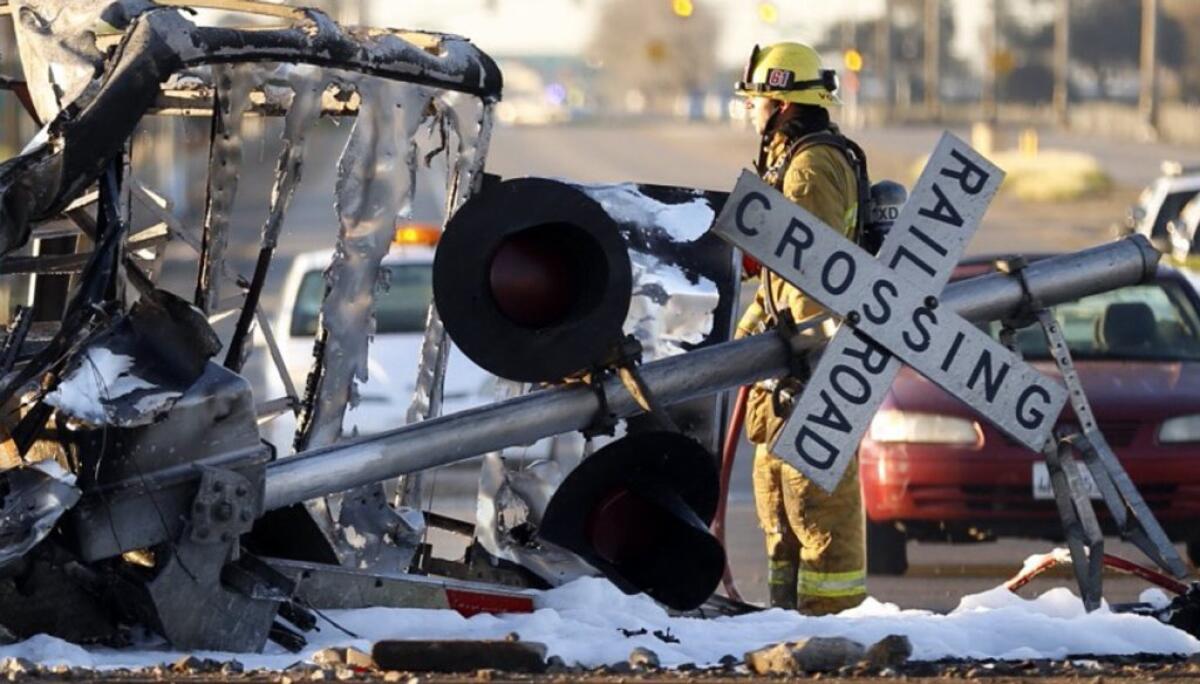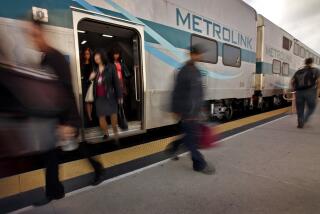Tired truck driver blamed for 2015 Metrolink derailment near Oxnard that killed 1 and injured dozens

- Share via
Federal investigators on Monday blamed last year’s derailment of a Metrolink commuter train on a tired truck driver who had gone without rest for 24 hours before mistakenly turning onto the tracks at a railroad crossing outside Oxnard.
The collision with a Ford F-450 utility truck and trailer occurred shortly before dawn on Feb. 24, 2015, near the crossing at South Rice Avenue and East Fifth Street.
Four Metrolink passenger cars derailed, injuring 32 of 51 passengers and crew members, including the engineer, Glenn Steele, 62, of Riverside County, who died seven days later. The truck driver, Jose Ramirez-Sanchez, 54, of Yuma, Ariz., received minor injuries.
National Transportation Safety Board investigators concluded in their report that Ramirez-Sanchez probably was fatigued when he turned right from Rice Avenue onto the tracks and became stuck on the right-of-way about 80 feet west of the grade crossing.
By the time he drove onto the tracks, investigators said, he had spent almost 17 hours on the road and had been on duty for 24 hours.
Research shows that inadequate sleep can result in decreased alertness, lapses in attention, mistakes in judgment and a higher risk of accidents.
“The driver erred in turning west on the railroad tracks rather than west onto East Fifth Street 57 feet farther south due to a combination of acute fatigue and unfamiliarity with the area,” the NTSB report stated.
After the impact, the train pushed the truck about 130 feet east of the crossing and three of the four derailed passenger cars rolled over on their sides. The trailer came to rest on the crossing, where it was destroyed by fire.
At the time of the collision, Ramirez-Sanchez worked for Growers Co. but was operating the vehicle for Harvest Management. Both firms are based in Arizona and operate fleets of trucks, buses and semi-trailers that serve the agricultural industry.
The crash raised questions about the safety and workmanship of 57 Hyundai Rotem cab cars that Metrolink bought several years ago to upgrade its fleet with more crash-resistant rolling stock. Cab cars are passenger cars with an engineer’s position. They operate at the front of trains when they reverse direction at the end of a line.
In the Oxnard crash, the cab car’s front-end deflector, or so-called pilot, which is designed to prevent debris from getting under train wheels, broke off on impact with the truck and was found behind the wreckage.
An in-house investigation by Metrolink concluded that the deflectors of its Hyundai cab cars had flawed welds, inadequate bracing and did not meet the railroad’s strength specifications. The inquiry also found quality problems with several couplers of the derailed passenger cars.
Though it has been suspected that the defective pilot contributed to the severity of the Oxnard crash, NTSB investigators said they found no markings or damage suggesting that the deflector itself interfered with the wheels of the train and caused the derailment.
Subsequent studies of one of the couplers indicated that it would have passed stress tests regardless of its workmanship, the NTSB report stated.
The flawed deflectors are now the subject of lawsuits filed against Hyundai Rotem Co. by injured passengers, the family of the deceased engineer and Metrolink, which received its last car from the company in 2014.
Railroad officials said they are reviewing and evaluating the NTSB report. They added that Metrolink took several safety measures after the faulty deflectors were discovered, such as placing 40 leased freight locomotives in cab car roles until the defective parts could be repaired or replaced.
A Metrolink spokesperson said that the last of the Burlington Northern Santa Fe Railway Co. engines were returned Nov. 1, and that 52 of the cab cars have been fixed. She added that 40 are back in service.
“Metrolink has fully cooperated with the NTSB throughout its investigation and took actions to enhance safety for our passengers and team members prior to the release of this report,” said Sherita Coffelt, the railroad’s director of public affairs.
Twitter: @LADeadline16
ALSO
Attorneys deliver closing arguments in Lee Baca’s obstruction of justice trial
Judicial panel clears California judge who gave lenient sentence in Stanford sexual assault
Man sentenced to life in prison for 1992 killing of his wife in ‘hired hit’ at La Mirada park
UPDATES:
5:05 p.m.: This article was updated with additional details from the National Transportation Safety Board report.
This story was originally published at 3 p.m.
More to Read
Sign up for Essential California
The most important California stories and recommendations in your inbox every morning.
You may occasionally receive promotional content from the Los Angeles Times.











